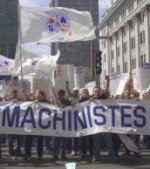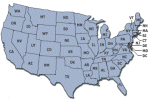|

Strike Over at Bombardier 70%
vote to accept contract.
Details.

Three West Coast governors
–
John A. Kitzhaber,
Gary Locke and
Gray Davis -- were interviewed recently on the IAM’s Third Shift program. Jobs, healthcare and college costs were some
of the issues affecting working families that the governors addressed.
Find out about health care in your state:

The Kaiser Family
Foundation's State Health Facts Online
resource contains the latest state-level data on demographics,
health, and health policy, including health coverage, access,
financing, and state legislation. |

Get Your Convention Gear
Check out gear for the
2004
IAM Convention

The IAM
Executive Council
International President
R.
Thomas Buffenbarger
Secretary Treasurer
Donald
E. Wharton
GVP Western
Territory
Lee
Pearson
GVP
Canada
GVP Canada
Dave
Ritchie
GVP Midwest
Territory
Alex
M. Bay
GVP Headquarters
Robert
V. Thayer
GVP
Southern
GVP Southern
Territory
George
Hooper
GVP Eastern
Territory
Warren
L. Mart
GVP Transportation
Robert
Roach, Jr.
|
Friday, May
10, 2002
Aerospace Delegates Vow
War on Economic Terrorism
More than 200 IAM aerospace delegates left Seattle and headed home to
fight the battle for jobs, security and prosperity in towns and cities
across North America.
“When we see
thousands of our members receiving pink slips and being laid off day
after day while industry profits go through the roof, that is war,
brothers and sisters. That is economic terrorism,” said GVP Bob Thayer
in his closing remarks to the 2002 Aerospace Conference.
“I realize these are
strong words, but there are no other words for the systematic
elimination of jobs; education and skills training; cuts in health care,
child and elder care,” Thayer said. “There is a reason job security is
the number one issue everywhere we go. If you don’t think we’re fighting
a war, ask our members. They know. We are fighting for our very
existence – for our right to have a job and make a decent living for our
families.”
Delegates spent four
full days studying methods to save jobs and promote domestic production;
to build political and community support and to communicate and organize
the struggle inside the workplace.
“We have a great
program,” Thayer said. “Now it’s up to each of us to go home and put it
into action.”
Senate Eyes Flawed Trade Pact
Senate negotiators cleared the path for a
patched-up Fast Track trade promotion authority measure to go to a floor
vote—perhaps as early as next week. Democrats successfully amended the
bill to provide greater protections to workers who lose jobs to unfair
trade deals. A Senate vote on the measure could come as early as next
week.
The House passed a
stripped-down Fast Track bill by a single vote earlier this year. That
measure lacked any worker protections whatsoever.
Additional
amendments to the trade bill are likely during floor debates next week.
Those amendments are needed to protect U.S. trade, health, safety and
environmental laws from Fast Track’s impact. Negotiations to resolve the
differences between the Senate and House versions could reach fever
pitch.
Fast Track gives
the President sole authority to negotiate trade deals and forbids
Congress any opportunity to correct flaws or problems, including lack of
environmental or worker protections. “This is not how Congress is
supposed to work,” said IP Tom Buffenbarger. “These issues demand open
discussion and debate before any legislation is adopted. That’s how it
should work.”
‘Day of Action’ Shows IAM Solidarity
Thousands of IAM members from Boston to Hawaii took part in the IAM’s
Transportation Day of Action on May 8. The goal of the Day of Action was
to bring awareness to the crucial job IAM members have in rebuilding
America’s transportation system. Activities in more than three-dozen
cities included press conferences, marches, rallies and providing
information and gifts to the traveling public.
“The benefits of rebuilding America’s transportation
system are far reaching,” said IP Tom Buffenbarger at a rally in
Seattle. “The advantages extend beyond the airports and rail stations
into the communities where our members live, pay taxes, and school their
children.”
“This day grew from
an idea at our Transportation Conference last August to become a
historic event that displayed the solidarity of the Machinists Union,”
said GVP Robert Roach, Jr., who led activities at Washington DC’s Union
Station, and at National and Dulles Airports. “The tragic events of 9/11
have made this day even more important. The strength of a union comes
from its members, and your support in making this day such a success
showed why we are the strongest transportation union in the world.”
Addressing the crowd
at Washington, DC’s National Airport, United States Deputy Secretary of
Transportation Michael Jackson acknowledged the role the IAM has played
in providing increased security in the wake of September 11. He also
urged laid-off IAM members to take advantage of their priority hiring
status for positions with the Transportation Security Administration (TSA).
The IAM began
discussions with the Department of Transportation immediately after the
airline lay-offs began suggesting that displaced airline workers be
offered jobs with the TSA.
Retirement ‘Boom’ Goes Bust
That much-ballyhooed stock market boom in the 1990s didn’t do much to
boost retirement security for middle-income workers. In fact, those
workers saw their retirement wealth fall, according to a study by the
Economic Policy Institute. Only the richest Americans saw their
retirement increase during that period, EPI says.
The study highlights
the importance of the working families campaign to protect and
strengthen Social Security, the only source of retirement income
that—unlike the stock market—is guaranteed, lifelong and rises with
inflation.
“The study sheds a
whole new light on the debate over Social Security,” says Jeff Faux, EPI
president. “It shows we’ve been trying to fix the part of the retirement
system that’s not broken.”
President Bush and
his allies have proposed partially privatizing Social Security, a move
that would cut benefits or raise the retirement age.
“It’s time to stop
talking about shifting Social Security money to private accounts and
start talking about how we can make sure that working Americans will
have adequate pensions that will enable them to live decently in
retirement.” Faux says.
Working Mothers
Work Longer Hours
Two in three working mothers, 66 percent,
work 40 or more hours every week, compared with 60 percent of women
without children, according to the AFL-CIO’s Ask a Working Woman
Survey 2000.
The survey found
that 28 percent of working mothers work nights or weekends, and that 40
percent work different schedules than their spouse or partner. Women of
color are more likely than white women to work a schedule that is
different from their spouse.
Among all women, 63
percent work more than 40 hours per week.
The survey is the
third in a series of such reports, and was part of a yearlong national
effort that included a field survey of more than 20,000 working women.
Here’s a Chance to Win a Hawg!
The Harley Davidson Corporation donated a stylish 2002 model motorcycle
to some lucky winner at the inaugural CBTU golf tournament to be held
May 25, 2002 in Las Vegas, Nevada. “All you have to do is score a
hole-in-one,” explained IP Tom Buffenbarger.
This tournament will
benefit the Coalition of Black Trade Unionists’ Scholarship Fund and the
community issues education project of the Congressional Black Caucus
PAC.
The challenging 9th
hole is 165 yards long, and is cosponsored by the PACE and the IAM,
added Diane Babineaux, executive assistant.
|





